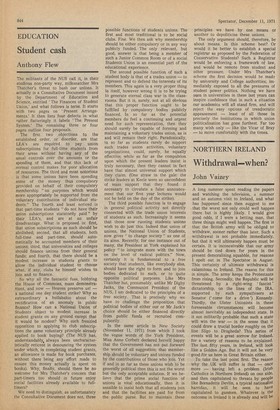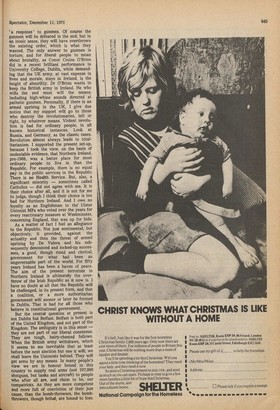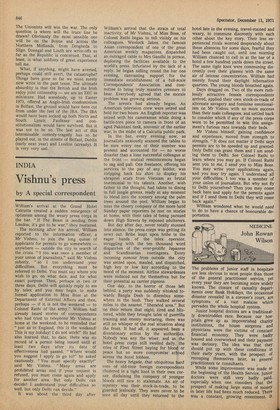NORTHERN IRELAND
Withdrawal when?
John Vaizey
A long summer spent reading the papers and watching the television, a summer and an autumn visit to Ireland, and what has happened since then suggest to me that the worst not only could well happen there but is highly likely. I would give good odds, if I were a betting man, that three things might well happen. The first is that the British army will be obliged to withdraw, sooner rather than later. Such a withdrawal is not probable immediately, but that it will ultimately happen must be certain. It is inconceivable that our army should be tied down for years in the present demoralising squabble, for reasons I spelt out in The Spectator in August. This certainty of ultimate withdrawal is calamitous to Ireland. The reason for this is simple. The army keeps the Protestants from rising. Secondly, the Republic will be threatened by a right-wing fascist dictatorship, on the lines of the IRA, supported by such sympathisers as Senator (' come for a drive ') Kennedy. Thirdly, the Ulster Unionists in these foreseeable circumstances will become almost inevitably an independent state. Is it not militarily probable that such a state will win the war — in the sense that it could draw a trucial border roughly on the line Sligo to Drogheda? This series of events will be a great sorrow for Ireland, for a variety of reasons to be explained. The last fifty years, in Ireland, will look like a Golden Age. But it will not be very good for us here in Great Britain either.
To take the last point first. The reason why the UK will suffer is that — once more — having left a problem (Irish Catholics in Northern Ireland) on one side, and then capitulated to threats by people like Bernadette Devlin, a typical nationalist harridan, it will be seen to have capitulated to gunmen. Whatever is the outcome in Ireland it is already and will be ' a response' to gunmen. Of course the gunmen will be defeated in the end; but in an ironic sense, they will have overthrown the existing order, which is what they wanted. The only answer to gunmen is torture; and for liberal people to moan about brutality, as Conor Cruise O'Brien did in a recent brilliant performance in University College, Dublin, while demanding that the UK army, at vast expense in lives and morale, stays in Ireland, is the height of absurdity. Dr O'Brien wants to keep the British army in Ireland. He who wills the end must will the means; including high-whine sounds directed at pathetic gunmen. Personally, if there is an armed uprising in the UK, I give due notice that my support will go to those who destroy the revolutionaries, left or right, by whatever means. Violent revolution is bad for ordinary people, in all known historical instances. Look at Russia, and Germany, as the classic cases. Revolution almost always leads to totalitarianism. I supported the present set-up, because I took the view, on the basis of undeniable evidence, that Northern Ireland, pre-1968, was a better place for most ordinary people to live in than the Republic. For example, there is no equal pay in the public services in the Republic There is no Health Service. But, alas, a significant minority — sometimes called Catholics — did not agree with me. It is their choice after all, and it is not for me to judge, though I think their choice is too bad for Northern Ireland. And I owe no loyalty as an Englishman to the' Ulster Unionist MPs who voted over the years for every reactionary measure at Westminster, concerning England, that was up for bids.
As a matter of fact I feel an allegiance to the Republic. Not just sentimental, but objectively, it provided, against the actuality and then the threat of armed uprising by De Valera and his subsequently denounced and locked-up successors, a good, though timid and clerical, government for what had been an ungovernable part of the world. For fifty years Ireland has been a haven of peace. The aim of the present terrorism in Northern Ireland is ultimately the overthrow of the Irish Republic as it now is. I have no doubt at all that the Republic will be challenged, in its present form, and that a coalition, or a more authoritarian government will sooner or later be formed in Dublin. That is bad for all those who believe in constitutional government.
But the central question at present is not Dublin but Belfast. Belfast is both part of the United Kingdom, and not part of the Kingdom. The ambiguity is in this sense — they are not part of our liberal consensus. They are tough, hairy-chested fellows. When the British army withdraws, which it seems to me inevitable that at least before the next election but one it will, we shall leave the Unionists behind. They will get arms by any means. In many people's view we are in honour bound in this country to supply real arms (not 107,000 shotguns, but tanks and aircraft) to people who after all are, and claim to be, our compatriots. As they are more competent and more full of conviction of their just cause, than the bomb-throwers, the bombthrowers, though lethal, are bound to lose. The Unionists will win the war. The only question is where will the truce line be drawn? Obviously the most sensible one will be on the Boyne and across the Northern Midlands, from Drogheda to Sligo. Donegal and Louth are write-offs as far as the Republic is concerned. That, at least, is what soldiers of great experience tell me.
What, if anything, might have averted, perhaps could still avert, the catastrophe? Things have gone so far we must surely now write in the past tense. The ultimate absurdity is that the British and the Irish enjoy joint citizenship — we are an EEC in miniature. Had somebody, up to Easter 1971, offered an Anglo-Irish condominium in Belfast, the ground would have been cut from under the feet of the IRA. The IRA would have been locked up both North and South. Lynch, Faulkner and constitutionalism would have survived. But it was not to be so. The last act of this interminable comedy-tragedy has to be played out, in the streets of Belfast, Dublin (early next year) and London (already). It is very very sad.












































 Previous page
Previous page